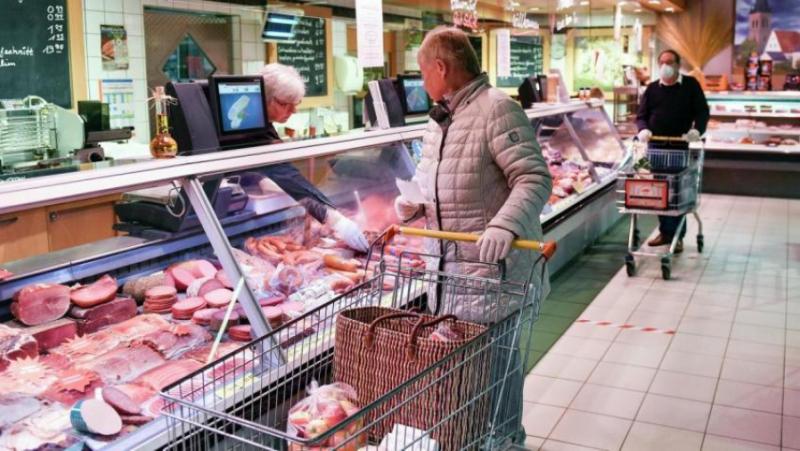/Pogled.info/ In December, inflation in the Eurozone could exceed ten percent. And next year, the major banks are waiting for a sharp slowdown in economic growth or a recession. The ECB has already raised its benchmark interest rate to a record high, but has admitted that it is unable to stop the price increase. On the consequences of the crisis for Europe – in the material.
Record level
Annual inflation in 19 euro-zone countries accelerated to a record 9.1% in August, reaching a new all-time high, according to Eurostat. The biggest contributor is the sharp rise in energy and food prices. In the energy sector, prices increased by 38.3 percent. Food, alcohol and tobacco with 10.6. Non-energy industrial goods such as clothing, appliances and automobiles – five, services – 3.8.
In Germany, Europe’s largest economy, inflation reached 8.8% year-on-year in August. This is a nearly half-century record.
The worst performers were in Estonia (25.2%), Lithuania (21.1) and Latvia (20.8). Outside the EU, the situation is no better, with Britain hitting a 40-year high of 10.1 in July, according to the Organization for National Statistics.
Golden electricity
According to the review by analyst firm Rystad, the monthly average price of electricity in Europe in August was the highest in the history of observations. The reason is clear: the sharp rise in gas prices.
“August prices broke records in all major European markets,” said company spokesman Fabian Renningen.
According to Rystad, the worst are Italy, France, Germany and Great Britain. Thus, in Italy, the average monthly exchange price exceeded 500 euros per megawatt hour, and the wholesale price for the next year in France and Germany – 1000.
In Britain they tried to introduce a price cap for electricity suppliers, but it didn’t help. According to analysts’ forecasts, electricity will already cost most British households 4,136 euros per year, and in a pessimistic scenario – 7,090. In February, there were two thousand, and the British government has already called this a severe financial blow to the population.
Interest doesn’t work
Inflation in the Eurozone has accelerated for three consecutive quarters, setting a new all-time high each month. Therefore, at the end of July, the European Central Bank (ECB) for the first time in history simultaneously raised the main interest rate by 0.75 basis points, to 1.25%.
According to Reuters, the ECB could raise interest rates to two percent or more. According to the president of the German Federal Bank and member of the Governing Council of the ECB, Joachim Nagel, inflation in the Eurozone will reach its peak in December, over ten percent.
The regulator admitted that it would not be possible to treat prices with monetary measures, as it is impossible to influence the prices of energy resources. Rising interest rates will only raise the cost of money, reduce consumer activity, and consequently slow the economy down.
“I am not in a position to make energy cheaper and to convince the major players in the global market to lower gas prices,” said ECB President Christine Lagarde. “I cannot reform the electricity market. It is good that the European Commission is moving in this direction, because monetary policy is weak here.
According to her, if the price of blue fuel continues to rise, the crisis will not be avoided.
Recession is inevitable
Economists predict a decline in Germany, Italy and Central and Eastern Europe as high energy prices reduce the purchasing power of the population. According to Morgan Chase, euro area GDP will decline by 2-2.5 percent in the fourth quarter of the year, in some countries by three.
“The indices show that Europe is entering recession sooner than we thought, and led by the continent’s largest economy: Germany. It is already clear that the recession will be prolonged,” according to experts from the Royal Bank of Canada.
As Economist magazine points out, the depth of the recession largely depends on European politicians. So far they have not given up on the idea of limiting the price of Russian gas, but there is no unity.
Fifteen EU countries have supported a price cap, but only three require it for Russia alone. Three others are undecided and would like to undertake long-term economic sustainability reviews. Five countries are against or neutral.
At the same time, according to the Guardian, alternative measures are being considered. In particular, an excess profit tax for European energy companies – to channel additional funds into mitigating the effects of the energy crisis.
Translation: V. Sergeev
IMPORTANT!!! Dear Pogled.info readers, we are limited due to our positions! Go directly to the site www.pogled.info . Share on your profiles, with friends, in groups and on pages. In this way we will overcome the limits and people will be able to reach the alternative point of view on the events !?
When you see the “fake news” sign, it means that this article is recommended to read !!!
Subscribe to our YouTube channel / top right /: https://www.youtube.com
Become friends with Look.info on facebook and recommend it to your friends
–


